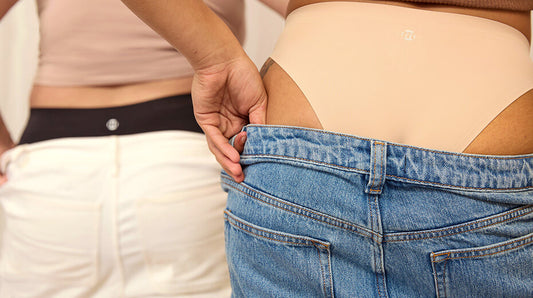A Comfortable Period: Secrets to Dealing with Period Pain
Period pain is a common problem experienced by women of all ages, from puberty to menopause. These pains, which are part of the menstrual cycle, manifest with symptoms such as muscle cramps, abdominal and back pain, nausea, vomiting, headache and fatigue.
Period pain can range from mild to severe. Mild pain can usually be relieved with simple measures such as rest, painkillers, and heat. However, severe period pain can be so uncomfortable that it negatively affects daily life.
In this article, we will discuss the causes of period pain, its symptoms, and how to relieve it. We will also examine issues such as what can be done to prevent period pain and the need to seek professional help.
WHAT IS MENSTRUATION PAIN?
What is Period Pain and What Causes It?
Period pain is a phenomenon that occurs when the uterus contracts. It is normal for the uterus to contract during menstruation, but these contractions can be a painful experience for some women. This is often associated with the release of chemicals called prostaglandins. Prostaglandins cause pain and discomfort by tightening the uterine muscles and constricting blood vessels.
What Does Severe Period Pain Mean?
Severe period pain refers to pain that is so intense and unbearable that it interferes with daily activities. If the pain prevents you from doing your normal daily activities or if the pain lasts longer than usual, you should discuss this with your doctor. Severe period pain can often indicate an underlying health problem and may require professional medical attention.
How Many Percentage Does Period Abdominal Pain Have?
Pain intensity is usually assessed using the del scale. Period pain varies greatly from person to person and is usually mild or moderate. This pain is considered normal for most women. However, if your pain is severe or is negatively affecting your quality of life, it is important to talk to a healthcare professional.

CAUSES OF MENSTRUATION PAIN
What Are the Main Causes of Menstrual Pain?
The main cause of menstrual cramps is the contraction of the uterus. These contractions are usually caused by the release of chemicals called prostaglandins. Prostaglandins cause pain and discomfort by tightening the uterine muscles and constricting blood vessels. Other important causes may include endometriosis, uterine polyps, fibroids, and thickening of the uterine lining.
Who Experiences More Period Pain?
Period pain can vary from woman to woman, but certain factors can affect the severity of period pain. People who experience more period pain are more likely to fall into one of the following groups:
- Young people, because the uterus is more active at a young age,
- Those who have a family history of severe menstrual pain,
- People who smoke,
- Those who had their first menstrual period at an early age.
Do Hormonal Changes Affect Menstrual Pain?
Yes, hormonal changes can affect menstrual cramps. Changes in levels of hormones like estrogen and progesterone throughout the menstrual cycle can affect uterine contractions and therefore menstrual cramps. Conditions that affect hormonal balance can increase the intensity of menstrual cramps.
Is There a Definitive Treatment for Menstrual Pain?
While there is no cure for period pain, there are effective management strategies for many women. These strategies include regular exercise, a healthy diet, heat treatments, acupuncture, and painkillers. Additionally, hormonal birth control methods and certain medications can help reduce period pain. However, if the pain is severe or is affecting your quality of life, it is important to talk to a healthcare professional. Because every woman’s situation is different, it is important to take an individualized approach to an effective treatment plan.
HOW CAN MENSTRUATION PAIN BE RELIEVED?
Do Warm Packs and Massages Help Relieve Period Pain?
Yes, heat treatments and massage can help relieve period pain. A hot water bottle or hot shower can relax muscles and increase blood flow, reducing pain. Massage can also relieve muscle tension and provide relief.
Can Stress Management Reduce Menstrual Pain?
Yes, stress management can reduce period pain. Stress can cause muscle tension and hormonal changes in the body, which can increase period pain. These effects can be reduced by regularly engaging in stress-reducing activities such as meditation and yoga.
What are the Yoga, Meditation and Exercise Recommendations for Period Pain?
- Yoga: Yoga poses that focus on the belly area can reduce muscle tension. Poses such as Child's Pose and Cat-Cow Pose can be tried.
- Meditation: Regular meditation can reduce stress and provide mental relaxation.
- Exercise: Light aerobic exercise can reduce pain by increasing the release of endorphins. Activities such as walking, swimming or cycling can be tried.
Can Acupuncture Relieve Period Pain?
Some studies suggest that acupuncture may be effective in relieving period pain. Acupuncture aims to balance the flow of energy in the body, which can reduce pain. However, individual responses may vary and it is important to talk to a qualified healthcare professional.
What Medications Relieve Period Pain?
Medications can reduce the severity of period pain and ease symptoms. Painkillers, anti-inflammatory drugs, and hormonal medications are often used for this purpose. These medications work by reducing inflammation, relieving muscle spasms, or regulating hormonal changes.
**It is important to consult a healthcare professional before using these medications, as not every medication is suitable for everyone and may have side effects.
Which Herbal Teas Are Good for Menstrual Pain?
- Chamomile tea: Can reduce pain by relaxing muscles.
- Peppermint tea: Can relax the digestive system and reduce muscle spasms.
- Ginger tea: It has anti-inflammatory properties.
These teas can relieve menstrual pain with their soothing properties.
Positions That Are Good for Period Pain? Fetal Position…
- Fetal position: Lying on your back with your legs pulled toward your abdomen can relieve muscle spasms.
- Leg wall position: Lying on your back and raising your legs up the wall can increase blood circulation and provide relief.
Is Chocolate Good for Menstrual Pain?
Although it is thought that chocolate can improve mood by increasing serotonin secretion, there is no clear scientific evidence that it reduces period pain. However, some women report that consuming chocolate makes them feel better. Since everyone’s body responds differently, individual trials are the best way to achieve the best results.
WHAT CAN BE DONE TO PREVENT MENSTRUATION PAIN?
What is the Effect of Regular Exercise on Menstrual Pain?
Regular exercise can reduce menstrual cramps. Exercise can help relieve pain by increasing the release of endorphins and overall relaxation. Light aerobic exercise, activities such as walking or yoga can help prevent menstrual cramps.
What is the Effect of a Healthy Diet on Menstrual Pain?
A healthy diet is an important factor in managing period pain. Consuming anti-inflammatory foods can reduce inflammation. A diet that includes foods that contain omega-3 fatty acids, such as fish, green leafy vegetables, whole grains, and fruits, can help relieve period pain.
What is the Effect of Magnesium-Containing Foods on Menstrual Pain?
Magnesium can reduce muscle tension and ease menstrual cramps. Foods that contain magnesium include almonds, peanuts, pumpkin seeds, spinach, and bananas. Magnesium supplements can also be considered, but it’s important to talk to a healthcare professional about this.
What is the Effect of Getting Enough Sleep on Menstrual Pain?
Getting enough, quality sleep has a positive effect on overall health and can reduce menstrual cramps. Lack of sleep can increase stress and lead to hormonal imbalances. Getting enough sleep at night can help relieve menstrual cramps.
PROFESSIONAL HELP AND TREATMENT OPTIONS
When to See a Doctor for Period Pain?
The time to see a doctor can vary from person to person, but it may be important to see a healthcare professional if:
- If the pain is very severe and prevents your daily activities,
- If severe menstrual pain continues regularly,
- If the pain cannot be controlled despite medication or home methods,
- If you have severe abdominal pain outside of your menstrual period.
Seeing a doctor is important to diagnose an underlying health problem and start appropriate treatment.
Modibodi MENSTRUATION PANTIES
Modibodi menstrual panties are an innovative product that can be used during menstruation. These panties are produced to provide leakage and hygiene thanks to a specially designed technology. Menstrual panties are generally preferred to increase the comfort of users, reduce the risk of leakage and generally make menstruation more comfortable.
Although period pants do not directly affect period pain, they provide a comfortable, leak-proof and hygienic experience. Thus, they help to manage your period more easily and indirectly support pain management.




